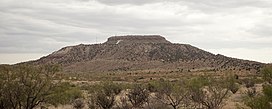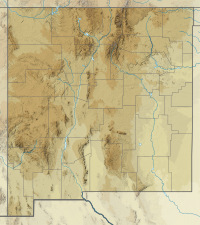| Tucumcari Mountain | |
|---|---|
 Mesa Tucumcari viewed from the west. Mesa Tucumcari viewed from the west. | |
| Highest point | |
| Elevation | 4,976 ft (1,517 m) NAVD 88 |
| Coordinates | 35°08′04″N 103°41′55″W / 35.13453091°N 103.69871754°W / 35.13453091; -103.69871754 |
| Geography | |
 | |
| Location | Quay County, New Mexico, U.S. |
| Topo map | USGS Tucumcari |
| Geology | |
| Rock age | Cretaceous |
| Climbing | |
| Easiest route | Drive (private land) |
Tucumcari Mountain, once referred to as Tucumcari Peak or Mesa Tucumcari, is a mesa situated just outside Tucumcari, New Mexico.
Where the mountain got its name is uncertain. It may have come from the Comanche word "tukamukaru", which means to lie in wait for someone or something to approach. A 1777 burial record mentions a Comanche woman and her child captured in a battle at Cuchuncari, which is believed to be an early version of the name Tucumcari.
The mountain was a key landmark along trails used by prehistoric Puebloans and Plains Indians, as well as the later Comancheros. The Comanche often used the mountain as a lookout, climbing up it to survey the landscape for animals to hunt. Pedro Vial referred to the mountain in 1793, while opening a trail between Santa Fe and St. Louis. Captain Randolph B. Marcy led an expedition past it in 1849. The French-American geologist Jules Marcou studied the geology of Tucumcari Mountain in 1853 and claimed that the Tucumcari strata were of Jurassic age. The Texas geologist, Robert T. Hill, visited "Mesa Tucumcari" in 1887 and again in 1891, and eventually concluded that the Tucumcari strata were much younger Cretaceous deposits, not Jurassic as suggested by Marcou. Also in 1891, William F. Cummins of the Geological Survey of Texas studied Tucumcari Mountain and his careful observations of the strata established beyond doubt the Cretaceous age of the Tucumcari beds.
The town of Tucumcari was founded in 1901 and, in 1908, took its name—both in real life and in legend—from the mountain. Residents of the town of Tucumcari have painted a hillside letter T on the mountain. A cartoon version of this mountain appears in Cars with 'RS' (for Radiator Springs) substituted for Tucumcari's 'T'.
See also
- Canadian River
- Caprock Escarpment
- Eastern New Mexico
- Llano Estacado
- Lucianosaurus
- Mescalero Ridge
- Pecos River
- Route 66
References
- ^ "Tucumcari". NGS Data Sheet. National Geodetic Survey, National Oceanic and Atmospheric Administration, United States Department of Commerce. Retrieved 2014-02-15.
- "The First Santa Fe Expedition: 1792-1793". Chronicles of Oklahoma. Oklahoma Historical Society. Retrieved 2014-02-13.
- Julyan, Robert. "Tucumcari". New Mexico State Record Center and Archives. Retrieved 2014-02-13.
- Gelo, Daniel J. (January 2000). ""Comanche Land and Ever Has Been ": A Native Geography of the Nineteenth-Century Comancheria". The Southwestern Historical Quarterly. 103 (3). Texas State Historical Association: 273–307. JSTOR 30239220.
- "Mesalands Scenic Byway". NewMexico.org. Retrieved 2014-02-13.
- Marcou, Jules (1858). Geology of North America. Zurich: Zürcher and Furrer. p. 121. OCLC 15278797.
- Hill, Robert T. (1892). On the occurrence of artesian and other underground waters in Texas, New Mexico, and Indian Territory, together with the geology and geography of those regions. p. 166. OCLC 17204624.
{{cite book}}:|work=ignored (help) - Hill, Robert T. 1893. Tucumcari. Science 22(545):23-25.
- Cummins, W.F. (1892). Dumble, E.T. (ed.). Notes on the geology west of the plains: Tucumcari, New Mexico. pp. 201–210. OCLC 6300790.
{{cite book}}:|work=ignored (help) - "The Legend of Tucumcari". Archived from the original on 2005-12-26. Retrieved 2014-02-13.
- "The real Route 66 inspirations behind Disney's Cars Land - latimes". Los Angeles Times. Archived from the original on 2018-10-18. Retrieved 2020-04-16.
This New Mexico state location article is a stub. You can help Misplaced Pages by expanding it. |